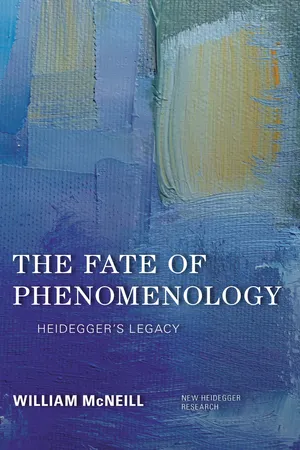
- English
- ePUB (mobile friendly)
- Available on iOS & Android
eBook - ePub
About this book
It can be easily argued that the radical nature and challenge of Heidegger's thinking is grounded in his early embrace of the phenomenological method as providing an access to concrete lived experience (or "factical life," as he called it) beyond the imposition of theoretical constructs such as "subject" and "object," "mind" and "body." Yet shortly after the publication of his groundbreaking work Being and Time, Heidegger appeared to abandon phenomenology as the method of philosophy. Why? Heidegger was conspicuously quiet on this issue. Here, William McNeill examines the question of the fate of phenomenology in Heidegger's thinking and its transformation into a "thinking of Being" that regards its task as that of "letting be." The relation between phenomenology and "letting be," McNeill argues, is by no means a straightforward one. It poses the question of whether, and to what extent, Heidegger's thought of his middle and late periods still needs phenomenology in order to accomplish its task—and if so, what kind of phenomenology. What becomes of phenomenology in the course of Heidegger's thinking?
Frequently asked questions
Yes, you can cancel anytime from the Subscription tab in your account settings on the Perlego website. Your subscription will stay active until the end of your current billing period. Learn how to cancel your subscription.
No, books cannot be downloaded as external files, such as PDFs, for use outside of Perlego. However, you can download books within the Perlego app for offline reading on mobile or tablet. Learn more here.
Perlego offers two plans: Essential and Complete
- Essential is ideal for learners and professionals who enjoy exploring a wide range of subjects. Access the Essential Library with 800,000+ trusted titles and best-sellers across business, personal growth, and the humanities. Includes unlimited reading time and Standard Read Aloud voice.
- Complete: Perfect for advanced learners and researchers needing full, unrestricted access. Unlock 1.4M+ books across hundreds of subjects, including academic and specialized titles. The Complete Plan also includes advanced features like Premium Read Aloud and Research Assistant.
We are an online textbook subscription service, where you can get access to an entire online library for less than the price of a single book per month. With over 1 million books across 1000+ topics, we’ve got you covered! Learn more here.
Look out for the read-aloud symbol on your next book to see if you can listen to it. The read-aloud tool reads text aloud for you, highlighting the text as it is being read. You can pause it, speed it up and slow it down. Learn more here.
Yes! You can use the Perlego app on both iOS or Android devices to read anytime, anywhere — even offline. Perfect for commutes or when you’re on the go.
Please note we cannot support devices running on iOS 13 and Android 7 or earlier. Learn more about using the app.
Please note we cannot support devices running on iOS 13 and Android 7 or earlier. Learn more about using the app.
Yes, you can access The Fate of Phenomenology by William McNeill in PDF and/or ePUB format, as well as other popular books in Philosophy & Phenomenology in Philosophy. We have over one million books available in our catalogue for you to explore.
Information
Table of contents
- Preface
- Note on Citations
- Note on Translations
- 1 “To the Things Themselves!” Heidegger’s Early Confrontation with Husserl’s Phenomenology
- 2 “A Few Steps Forward?” On Heidegger’s Radicalization of Phenomenology
- 3 From Phenomenology to Letting Be: On the Way to Gelassenheit
- 4 A Question of Method? The Crisis of Phenomenology and “The Origin of the Work of Art”
- 5 Beyond Phenomenology? From Being and Time to Ereignis
- 6 The Quiet Force of the Possible: From Destruktion to the History of Being
- 7 The Last Word of Phenomenology
- Works Cited
- About the Author